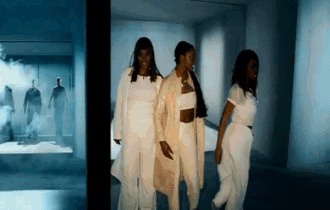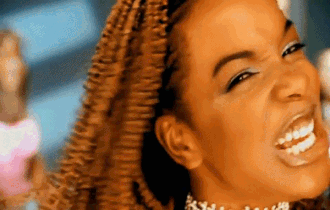Released: 17th July 2000
Writers: Cleopatra Higgins / Zainam Higgins / Yonah Higgins / Christine Higgins / Cutfather And Joe
Peak position: #29
Chart run: 29-50-59
After finding fame in the UK and America with their debut album, Comin’ Atcha!, Cleopatra were joined by a team of top songwriters to help create the follow-up. But things didn’t quite go to plan when the group stepped out with a more mature sound and image…

Cleopatra were one of the breakout success stories of the late ‘90s. The sisters – Cleo, Zainam and Yonah Higgins – reached #3 in the UK with their first single, Cleopatra’s Theme. And, while several further hits followed in 1998, the group’s profile was elevated when they signed to Madonna’s Maverick Records label in America. It was a big deal, which saw Cleopatra’s Theme peak at #26 on the Billboard Hot 100. There was a genuine buzz around the group, too, which saw them land an hour-long TV special (Cleopatra In Concert) on the Disney Channel. A fictional series – titled Comin’ Atcha and later Cleopatra In The House – starring the group as themselves also aired for two seasons on CITV in the UK. Yet, the scale of that exposure and the demands it placed on Cleopatra weren’t without consequence. The tail-end of the Comin’ Atcha album campaign had already gone slightly awry when A Touch Of Love reached #24 in the UK, partly due to the group diverting their attention to America.

While Cleopatra had already attained a level of international success that evaded many other homegrown pop acts, it also piled a degree of pressure on their second album. Expectations were inevitably higher than those of Comin’ Atcha! and, unlike many of their peers, whose focus remained predominantly on the UK, the group’s material had to be developed with a broader international audience in mind. And truthfully, seizing the opportunity to capitalise on – and attempt to further grow – Cleopatra’s American success was always likely to be a significant factor in dictating what they did next. That, ultimately, is what shaped the direction of Steppin’ Out.

Though the group remained heavily involved in writing their second album, they were joined by collaborators including Cutfather & Joe, Jimmy Jam & Terry Lewis and Stargate. Not all of them are intrinsically associated with creating R&B (in fact, Stargate had only recently produced S Club Party for S Club 7 and Day & Night for Billie Piper), but that was very much the intended direction for Steppin’ Out. It was accompanied by a more mature image that distanced the group from the styling of Comin Atcha!, even though they were all still teenagers. Nothing about this necessarily came across as disingenuous. It’s entirely believable as a look and sound that reflected Cleopatra’s own musical tastes while playing into how the record label wanted to market them. Yet, in doing so, almost everything about the group’s debut that resonated so strongly with audiences was absent from Steppin’ Out.

That’s certainly something which characterised Come and Get Me when it was released as the lead single in the UK (America received U Got It instead) and became a distraction from the fact that – in its own right – this is a great track. With its dramatic electric piano melody and dulcet vocal riff (“Huh-huh, yeah…”), the intro casts an imposing grandiosity that makes a statement of this as a big, bold comeback. And it is, but once the beat drops, the production – courtesy of Cutfather & Joe – is much poppier than Come and Get Me is often given credit for being. The thumping bass and guitar licks add an R&B leaning edge. Still, if this had just been unveiled as Cleopatra’s new single without all the extraneous noise around the album being more mature than their debut, maybe the song would have been viewed as the coherent evolution – rather than a total departure – that it actually is.

Come and Get Me is rooted heavily in teen relationship drama, and Cleopatra’s assertiveness over the situation is consistent with the precocious identity they’d firmly established: “You know I’ve been checking you out, ever since we’ve been hanging out, you told your boys it’s me that you like, but when you try to tell me, you run and hide”. Furthermore, the group’s intentions are never expressed in a way that juxtaposes their ages. Even parts which could be performed suggestively (“Now we can see behind the door, don’t let it linger anymore, you don’t want me to take the first step, so reel me in and I’ll accept”) are instead delivered with a bombastic enthusiasm that mirrors both the vigour of the backing track and the energy of their earlier material. Indeed, the pre-chorus even features a self-referential nod to previous singles: “Ever since Cleopatra’s Theme, you’ve wanted a touch of love (all night)…”. In many ways, Come and Get Me is thoughtfully composed to manage the transition to Cleopatra’s second album smoothly.

And in terms of delivering on expectations, the track creates ample space for Cleo Higgins to showcase her phenomenal voice. The spirited, toe-tapping chorus: “I want (I want), I need (I need), I have to get your love; you want (you want), want me (want me), so let’s not play hide, play seek (just come and get me)” is suitably catchy. However, Cleo’s presence increases as the song progresses until her vocals are ricocheting and reverberating through the production. It never comes across as showboating; if anything, there’s – perhaps – a sense that her talent is far bigger than a track like Come and Get Me. Certainly, she is the best thing about it, though that’s more a reflection of her than a criticism of the song choice.

The accompanying music video for Come and Get Me has the appearance of a group with a considerable budget behind them. It shows them in an abstract, slightly futuristic-looking set performing the song while being pursued by male extras. Impeded by rotating doors and moving walls, the men eventually fall through a corridor (portrayed using some slightly dodgy effects and camera angles) into a shallow pool of water around which Cleopatra are lounging on plush white seats. Narratively, there are some loose parallels to the hide-and-seek lyric in the song, but it does come across as a little style over substance. The colour palette predominantly uses shadows and cool blues, with occasional splashes of orange lighting to create a very Y2K aesthetic. Similarly, Cleopatra’s fashion is sleeker and more muted than the Comin’ Atcha! era where each member often had vivid primary colours running through their outfits. This video isn’t bad; it’s perfectly functional for Come and Get Me. However, presenting the group as glossy, glamorous pop stars is a leap from their image as the relatable girls next door, which their TV series had further reinforced. It’s not to say Cleopatra couldn’t ever move beyond that, but the track might’ve benefitted from something more gradual to bring their fanbase with them.

Despite their blip in the UK with A Touch Of Love, Cleopatra’s comeback should still have been able to guarantee them exposure. And yet, the song wasn’t as widely promoted as it could’ve been, while press coverage – particularly in pop music magazines – was similarly limited now that the group were ostensibly an R&B act. Come and Get Me debuted and peaked at #29, spending three weeks in the top 75. If there’s any consolation to be taken, the song did, at least, chart here because, in America, U Got It didn’t make any impact whatsoever. And while Steppin’ Out was released there on the Maverick label – though again failing to make any impact – WEA shelved the album entirely in the UK. And that was pretty much it for the campaign. No further singles followed, and Cleopatra were dropped in 2001.

So what went wrong? There’s an argument that Cleopatra’s label could have done more to support them in how prominently Come and Get Me was marketed. And indeed, abandoning the campaign after one single would suggest they were too eager to cut their losses. It also feels that the whole image around Steppin’ Out was poorly managed. Switching things up so dramatically played into a negative perception of British pop acts trying to Americanise their image and become something they weren’t. Perhaps most fundamentally, though, is that the album lacked something to define it. The “Cleopatra, comin’ atcha” lyric was an easily communicable catchphrase that represented what their debut was all about. The follow-up, therefore, needed a similarly impactful hook for this next phase of their career (a Spice Up Your Life or an Oops!…I Did It Again). A song that might just’ve done that is Flowers – later recorded by Sweet Female Attitude – which was offered to Cleopatra. However, their record label turned it down, feeling it wasn’t the right direction to push them in. Come and Get Me is a great pop song, and Steppin’ Out is a solid album, but that wasn’t enough in such a competitive market.

It’s also alleged that WEA didn’t push Steppin’ Out as much as they could’ve because they wanted to launch Cleo Higgins as a solo artist. And after dropping Cleopatra in 2001, that’s what they attempted to do. However, rather than nurture the talent she’d already proven as a singer and songwriter, they foisted material on her that aimed to pitch her as a coquettish early-‘00s R&B-pop princess. For the acts already doing that, it was fine. But it’s not the direction Cleo Higgins wanted to move in and plans to work with the Warner company on an album subsequently fell through.

There’s another issue, and it’s not to take anything away from Cleopatra, but saying – as many commentators did – that they’d cracked America somewhat overstates things. Cleopatra’s Theme was, undeniably, a big hit for a UK pop act, reaching #26. But despite selling 300,000 copies of Comin’ Atcha (again, an impressive total), the album never peaked higher than #109. Similarly, the album was never a major seller in the UK either, reaching #20 and spending four weeks in the top 75. Thus, it did seem as if WEA approached Steppin’ Out with an assumption that the album would sell itself without any substantial basis for that to be the case. The industry was moving quickly, and the label needed to push Cleopatra hard to recapture momentum rather than assume they could coast on the (modest) accomplishments of Comin’ Atcha!

In hindsight, Steppin’ Out now feels, if anything, slightly ahead of its time; the album isn’t a million miles from the material Christina Milian and other pop-R&B acts enjoyed success with a few years later. Cleopatra could easily have been part of that movement, and so many factors that resulted in Come and Get Me underperforming were beyond their control. Whatever went wrong with Steppin’ Out, the group deserved so much more than for their talent to be so readily squandered.



